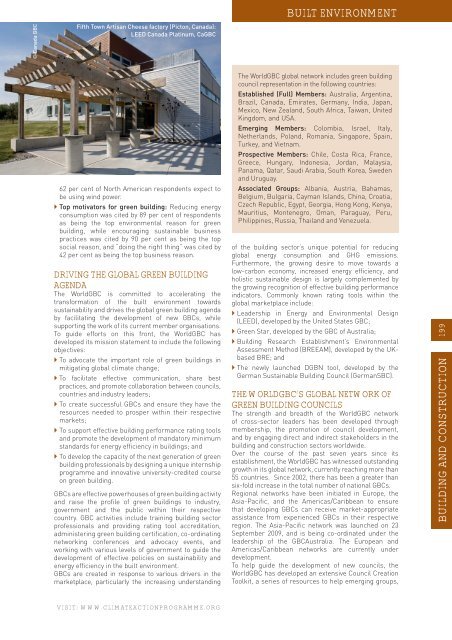Climate Action 2009-2010
You also want an ePaper? Increase the reach of your titles
YUMPU automatically turns print PDFs into web optimized ePapers that Google loves.
BUILT ENVIRONMENT<br />
© Canada GBC<br />
Fifth Town Artisan Cheese factory (Picton, Canada):<br />
LEED Canada Platinum, CaGBC<br />
62 per cent of North American respondents expect to<br />
be using wind power.<br />
} Top motivators for green building: Reducing energy<br />
consumption was cited by 89 per cent of respondents<br />
as being the top environmental reason for green<br />
building, while encouraging sustainable business<br />
practices was cited by 90 per cent as being the top<br />
social reason, and “doing the right thing” was cited by<br />
42 per cent as being the top business reason.<br />
DRIVING THE GLOBAL GREEN BUILDING<br />
AGENDA<br />
The WorldGBC is committed to accelerating the<br />
transformation of the built environment towards<br />
sustainability and drives the global green building agenda<br />
by facilitating the development of new GBCs, while<br />
supporting the work of its current member organisations.<br />
To guide efforts on this front, the WorldGBC has<br />
developed its mission statement to include the following<br />
objectives:<br />
} To advocate the important role of green buildings in<br />
mitigating global climate change;<br />
} To facilitate effective communication, share best<br />
practices, and promote collaboration between councils,<br />
countries and industry leaders;<br />
} To create successful GBCs and ensure they have the<br />
resources needed to prosper within their respective<br />
markets;<br />
} To support effective building performance rating tools<br />
and promote the development of mandatory minimum<br />
standards for energy efficiency in buildings; and<br />
} To develop the capacity of the next generation of green<br />
building professionals by designing a unique internship<br />
programme and innovative university-credited course<br />
on green building.<br />
GBCs are effective powerhouses of green building activity<br />
and raise the profile of green buildings to industry,<br />
government and the public within their respective<br />
country. GBC activities include training building sector<br />
professionals and providing rating tool accreditation,<br />
administering green building certification, co-ordinating<br />
networking conferences and advocacy events, and<br />
working with various levels of government to guide the<br />
development of effective policies on sustainability and<br />
energy efficiency in the built environment.<br />
GBCs are created in response to various drivers in the<br />
marketplace, particularly the increasing understanding<br />
The WorldGBC global network includes green building<br />
council representation in the following countries:<br />
Established (Full) Members: Australia, Argentina,<br />
Brazil, Canada, Emirates, Germany, India, Japan,<br />
Mexico, New Zealand, South Africa, Taiwan, United<br />
Kingdom, and USA.<br />
Emerging Members: Colombia, Israel, Italy,<br />
Netherlands, Poland, Romania, Singapore, Spain,<br />
Turkey, and Vietnam.<br />
Prospective Members: Chile, Costa Rica, France,<br />
Greece, Hungary, Indonesia, Jordan, Malaysia,<br />
Panama, Qatar, Saudi Arabia, South Korea, Sweden<br />
and Uruguay.<br />
Associated Groups: Albania, Austria, Bahamas,<br />
Belgium, Bulgaria, Cayman Islands, China, Croatia,<br />
Czech Republic, Egypt, Georgia, Hong Kong, Kenya,<br />
Mauritius, Montenegro, Oman, Paraguay, Peru,<br />
Philippines, Russia, Thailand and Venezuela.<br />
of the building sector’s unique potential for reducing<br />
global energy consumption and GHG emissions.<br />
Furthermore, the growing desire to move towards a<br />
low-carbon economy, increased energy efficiency, and<br />
holistic sustainable design is largely complemented by<br />
the growing recognition of effective building performance<br />
indicators. Commonly known rating tools within the<br />
global marketplace include:<br />
} Leadership in Energy and Environmental Design<br />
(LEED), developed by the United States GBC;<br />
} Green Star, developed by the GBC of Australia;<br />
} Building Research Establishment’s Environmental<br />
Assessment Method (BREEAM), developed by the UKbased<br />
BRE; and<br />
} The newly launched DGBN tool, developed by the<br />
German Sustainable Building Council (GermanSBC).<br />
THE WORLDGBC’S GLOBAL NETWORK OF<br />
GREEN BUILDING COUNCILS<br />
The strength and breadth of the WorldGBC network<br />
of cross-sector leaders has been developed through<br />
membership, the promotion of council development,<br />
and by engaging direct and indirect stakeholders in the<br />
building and construction sectors worldwide.<br />
Over the course of the past seven years since its<br />
establishment, the WorldGBC has witnessed outstanding<br />
growth in its global network, currently reaching more than<br />
55 countries. Since 2002, there has been a greater than<br />
six-fold increase in the total number of national GBCs.<br />
Regional networks have been initiated in Europe, the<br />
Asia-Pacific, and the Americas/Caribbean to ensure<br />
that developing GBCs can receive market-appropriate<br />
assistance from experienced GBCs in their respective<br />
region. The Asia-Pacific network was launched on 23<br />
September <strong>2009</strong>, and is being co-ordinated under the<br />
leadership of the GBCAustralia. The European and<br />
Americas/Caribbean networks are currently under<br />
development.<br />
To help guide the development of new councils, the<br />
WorldGBC has developed an extensive Council Creation<br />
Toolkit, a series of resources to help emerging groups,<br />
BUILDING AND CONSTRUCTION 199<br />
VISIT: WWW.CLIMATEACTIONPROGRAMME.ORG












